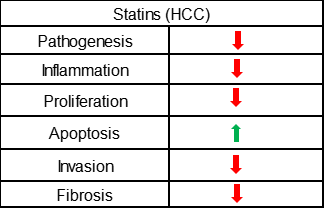Yuntian/PharmaSourcesApril 20, 2023
Tag: HCC , Statins , Liver cancer
Hepatocellular carcinoma (HCC) is a common primary malignant tumor of the liver, accounting for more than 80% of primary liver cancers. In the world, liver cancer is the fifth and seventh most common cancer, and the third and sixth leading cause of cancer-related death in men and women, respectively. Due to the poor prognosis, the mortality rate of hepatocellular carcinoma is almost as high as the morbidity rate. In general, patients with liver cancer are usually diagnosed at an advanced stage, which means that some treatments (e.g., surgical resection and liver transplantation) are only available for a limited number of patients. The only therapeutic drugs approved by the FDA for first-line treatment of liver cancer are sorafenib and regorafenib, and these two drugs only extend median survival time by 10-12 weeks. The rise of immune checkpoint inhibitors (such as nivolumab and pembrolizumab) are also in the early stages of development and are generally used in second-line treatment. Given the lack of effective treatments and the low survival rate of most liver cancer patients, there is an urgent need for the development of novel liver cancer drugs.

Figure 1 Statins improve hepatocellular carcinoma (HCC)
Multiple preclinical and clinical research having been conducted shows that statin use is associated with reduced mortality rates associated with a variety of cancers, including hepatocellular carcinoma (HCC). For virus-associated hepatocellular carcinoma (HCC), a survey involving 328,946 HBV-infected patients (the incidence rate of hepatocellular carcinoma is 310.4/100000) showed that the incidence rate of hepatocellular carcinoma (HCC) was negatively associated with statin use. Similarly, a large survey of HCV infection showed that the decreased risk of hepatocellular carcinoma (HCC) development was strongly associated with statin use. These studies show that the use of statin helps improve HBV and HCV-related hepatocellular carcinoma (HCC).
Simvastatin exhibited a dose-dependent inhibitory effect on both human hepatoblastoma cells (Huh6) and HepG2 cells. In addition to inhibition of tumor cell proliferation, potential mechanisms that have been identified for statins to improve hepatocellular carcinoma (HCC) include Promoting tumor cell apoptosis, inhibiting angiogenesis, anti-tumor cell invasion, anti-inflammation, anti-liver fibrosis, and affecting the course of HCV disease.
Specifically, current research shows that cerivastatin, lovastatin, and simvastatin do inhibit tumor proliferation. Among them, cerivastatin blocks Ras- and Rho-mediated cell proliferation; lovastatin inhibits activation of the proteasome pathway, leading to stabilization of p21 and p27; and it blocks the G1/S and G2/M transitions, thereby blocking the cell cycle; the combination of simvastatin and lovastatin inhibits hepatic stellate cell proliferation as well as collagen homeostasis levels.
Moreover, among the statins that induce apoptosis, fluvastatin, simvastatin, and lovastatin downregulate the MVA pathway and inhibit isoprenoid modification of small G proteins; simvastatin can non-classically regulate RhoA and Rac1 GTPases through downstream superoxide mediated activation of the JNK pathway; meanwhile, simvastatin has the effect of activating Bax with downregulation of BCL-2; lovastatin activates caspases, as well as inhibits BCL-2 and upregulates Bax (by regulating the MEK-ERK pathway); atorvastatin activates caspase-9 and caspase-3 in hepatic stellate cells; the combination of fluvastatin and celecoxib upregulates the cell cycle protein-dependent kinase inhibitor p21 (Waf1/Cip1) and downregulates pAkt, myeloid leukemia 1 (Mcl1), and survivin proteins.
In addition, statins that affect angiogenesis and tumor cell invasion include: cerivastatin, atorvastatin, and simvastatin; those affecting the course of HCV are lovastatin; those that inhibit the proliferation of embryonic stem cells include simvastatin; and those that inhibit Myc phosphorylation and activation are atorvastatin.
In summary, we can see that statins help to improve liver cancer and have been confirmed by a large number of clinical and scientific trials. In the future, novel liver cancer drugs can be developed based on statins through various pathways such as new use of old drugs, combination use and structural modification. We can be sure that statins will continue to bring us new surprises.
Hepatocellular Carcinoma and Statins,2020;
Systematic review with network meta-analysis: statins and risk of hepatocellular carcinoma,2016;
The immunology of hepatocellular carcinoma,2018.
Yuntian, Ph.D. in medicinal chemistry, is mainly engaged in small molecule drug research, especially good at small molecule drug synthesis process and later stage drug development research. He has completed the synthesis and activity evaluation of multiple anti-cancer drug molecules.


Contact Us
Tel: (+86) 400 610 1188
WhatsApp/Telegram/Wechat: +86 13621645194
+86 15021993094
Follow Us:




 Pharma Sources Insight July 2025
Pharma Sources Insight July 2025


